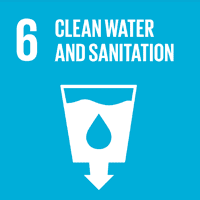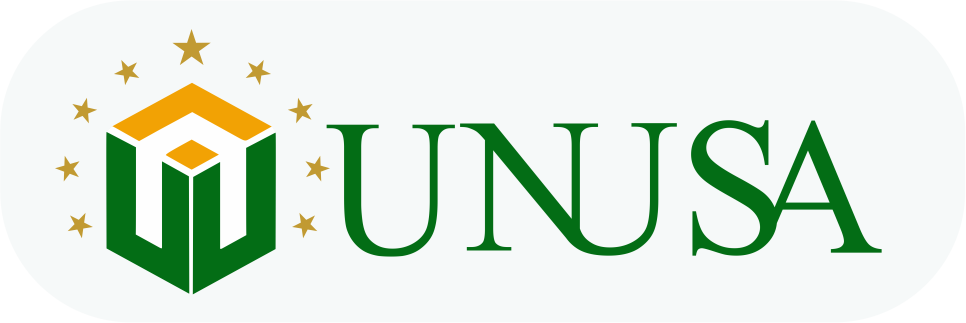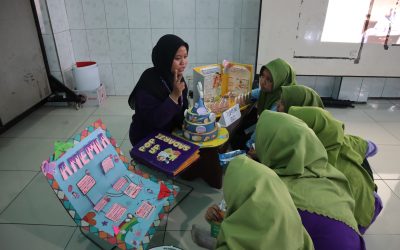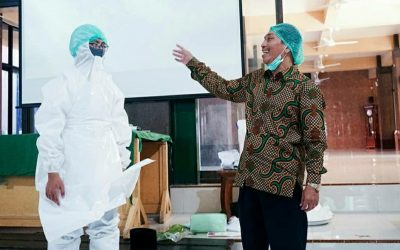6
CLEAN WATER AND SANITATION
Ensuring the availability and sustainable management of clean water and sanitation for all
Clean Water and Sanitation

The clean water and sanitation indicator focuses on universal access to clean water and adequate sanitation for all. The goal of this indicator is to reduce the number of people without access to safe and affordable water sources and to improve water quality by reducing pollution. This indicator also emphasizes the importance of good sanitation practices, such as the use of safe and hygienic toilets. Achieving this indicator is expected to improve health, reduce the risk of disease, and support sustainable development. Access to clean water and adequate sanitation is also a foundation for economic growth and social well-being.
Your content goes here. Edit or remove this text inline or in the module Content settings. You can also style every aspect of this content in the module Design settings and even apply custom CSS to this text in the module Advanced settings.
Your content goes here. Edit or remove this text inline or in the module Content settings. You can also style every aspect of this content in the module Design settings and even apply custom CSS to this text in the module Advanced settings.
Your content goes here. Edit or remove this text inline or in the module Content settings. You can also style every aspect of this content in the module Design settings and even apply custom CSS to this text in the module Advanced settings.
Your content goes here. Edit or remove this text inline or in the module Content settings. You can also style every aspect of this content in the module Design settings and even apply custom CSS to this text in the module Advanced settings.
Water in the Community Measures at Universitas Nahdlatul Ulama Surabaya (Unusa)
- Educational Opportunities for Local Communities
- Promotion of Conscious Water Usage
- Support for Water Conservation Off-Campus
- Sustainable Water Extraction Technologies
- Cooperation with Governments on Water Security
Universitas Nahdlatul Ulama Surabya (Unusa) actively contributes to raising awareness about sustainable water management by offering educational opportunities to local communities and beyond. Through webinars, discussions, and events, Unusa fosters a deeper understanding of the importance of water conservation and efficient usage, emphasizing its relevance in addressing global sustainability challenges.
These initiatives aim to provide practical knowledge and insights into water management practices, making sustainability more accessible to diverse audiences. Unusa outreach extends to professionals, students, and community members, ensuring a broad impact and encouraging collaborative efforts toward environmental preservation.
One key aspect of these educational programs is their focus on practical solutions tailored to local contexts. By addressing challenges specific to water usage and conservation in Indonesia, UII empowers participants to implement sustainable practices in their communities and industries, bridging the gap between theory and action.
Through these efforts, Unusa not only strengthens its commitment to environmental stewardship but also contributes to national-level discussions on sustainable development. These educational opportunities position Unusa as a leader in promoting sustainable water management practices, both within and beyond the academic sphere.
Universitas Nahdlatul Ulama Surabaya (Unusa) actively promotes mindful water usage as part of its broader commitment to environmental sustainability. On campus, Unusa incorporates innovative water conservation strategies, including large lakes designed to collect and store rainwater. These lakes serve as a practical solution to manage water resources effectively while contributing to the campus’s natural ecosystem.
The university also prioritizes the preservation of open spaces that support rainwater absorption and minimize surface runoff. These spaces not only enhance water conservation efforts but also promote biodiversity and provide a serene environment for students, staff, and visitors.
In addition to its physical infrastructure, Unusa integrates water conservation principles into its community outreach efforts. Educational programs and collaborative projects aim to inspire individuals and organizations to adopt similar practices, amplifying the university’s impact beyond its campus boundaries.
By combining infrastructural innovations with educational initiatives, Unusa demonstrates its dedication to sustainable water management. These efforts highlight Unusa leadership in fostering environmental responsibility and its commitment to the Sustainable Development Goals (SDGs).
Universitas Nahdlatul Ulama Surabaya (Unusa) extends its commitment to water conservation beyond the campus through impactful off-campus initiatives. One notable example is the university’s provision of thousands of biopores to local communities. These biopores, which are small, cylindrical holes drilled into the ground, facilitate rainwater absorption and help prevent water runoff, enhancing groundwater recharge and soil quality.
This initiative reflects Unusa dedication to supporting sustainable water management practices at the community level. By introducing biopores, the university empowers residents to take active roles in water conservation, fostering a collective effort to mitigate flooding and ensure sustainable water availability.
In addition to distributing biopores, Unusa provides education and training on their usage and benefits. This approach ensures that community members not only receive the tools but also understand how to utilize them effectively for long-term environmental impact.
Through initiatives like these, Unusa demonstrates its proactive stance in addressing water conservation challenges. By bridging university expertise with community action, Unusa contributes meaningfully to achieving water sustainability and advancing the broader goals of environmental stewardship.
Universitas Nahdlatul Ulama Surabaya (Unusa) adopts sustainable water extraction technologies to support its environmental stewardship goals and ensure efficient water management on campus. Central to this effort is the operation of a water treatment plant that uses groundwater from deep wells as its primary raw water source. This facility underscores Unusa commitment to sustainable practices while addressing the university’s water needs.
The water treatment plant employs advanced filtration methods, including sand and carbon filters. These filters are designed for regular cleaning and reuse, extending their operational life and minimizing waste. This approach not only enhances the efficiency of water treatment but also aligns with sustainable practices by reducing the need for disposable components.
Beyond its operational purpose, the facility serves as a hands-on educational resource for students, particularly those studying environmental engineering and water treatment technologies. Students gain practical experience and insights into sustainable water management, preparing them to contribute effectively to similar initiatives in their future careers.
By integrating sustainable technology with academic enrichment, Unusa demonstrates its dedication to responsible resource use and education. This initiative reflects the university’s broader mission to foster sustainability both on and off-campus, setting a benchmark for environmentally conscious water extraction and management practices.
Universitas Nahdlatul Ulama Surabaya (Unusa) actively collaborates with governments and organizations at local, regional, national, and international levels to address water security challenges. These partnerships are central to Unusa commitment to sustainable water management and conservation, benefiting both the university and the broader community.
At the local and national levels, Unusa has worked closely with government entities to construct two large lakes on its campus. These lakes serve as vital resources for rainwater conservation, reducing surface water runoff, replenishing groundwater, and supporting biodiversity. This initiative demonstrates Unusa dedication to water security while contributing to the sustainable development of its surrounding area.
On the global stage, Unusa engages with international partners to develop and participate in water security programs. These collaborations emphasize knowledge exchange, research, and the implementation of best practices in water management. By leveraging global expertise, Unusa enhances its ability to contribute to innovative and effective water conservation strategies.
Through these cooperative efforts, Unusa not only supports the immediate water needs of its campus and community but also advances broader sustainable water management goals. These initiatives highlight the university’s proactive role in fostering environmental sustainability and addressing critical water security issues at multiple levels.
News
Transformasi Kesehatan Pesantren: Dosen FKes Unusa Hadirkan Pameran Gizi Inspiratif
DALAM upaya meningkatkan kualitas kesehatan dan pemberdayaan masyarakat di lingkungan pesantren. Dosen dari Prodi Kesehatan Masyarakat (Kesmas) Universitas Nahdlatul Ulama Surabaya (Unusa) menggelar pameran gizi yang inspiratif dan edukatif. Kegiatan ini menjadi...
Mengukur Kesehatan Santri: Dari Gizi, Kebersihan, Hingga Kesehatan Mental
PONDOK PESANTREN menjadi salah satu lembaga pendidikan yang memiliki pengaruh besar di Indonesia. Selain menanamkan ilmu agama, pondok pesantren juga berperan penting dalam pembinaan karakter dan kesehatan santri. Namun, pondok pesantren juga merupakan tempat yang...


